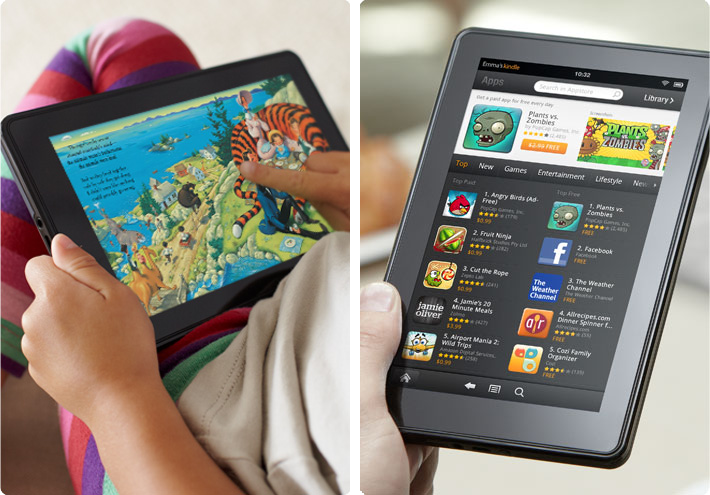Amazon estimated to lose $50 per Kindle Fire sold
Not a true competitor, but stronger than expected
Munster wrote that the "Kindle Fire's 7 inch screen compared to the 10 inch iPad is a bigger difference than the numbers make it seem," noting, as Apple's Steve Jobs did last year, that "a 7 inch screen is only 45% as large as the iPad's 10 the screen." Jobs' comments at the time were directed at RIM's PlayBook and the Samsung Galaxy Tab, predicting that the market wouldn't embrace either and stating that the only reason competitors were introducing the smaller screens is because they couldn't afford to build full size tablets at a price completive with the iPad.
Munster added that despite less storage, no cameras and lacking a 3G mobile data option, the Kindle Fire "is more competitive than we anticipated due to its new movie, music, and web browsing capabilities."
Amazon "likely losing about $50 per Kindle Fire"
The analyst added that "Amazon appears to be focusing on a product with superior content delivery; the company is leveraging its wide range of content assets available for sale in conjunction with its Cloud Services product for world class, mobile, digital delivery."
"Apple is also monetizing the hardware upfront with a 30%+ gross margin on the iPad, whereas Amazon is likely losing about $50 per Kindle Fire."
The difference between Apple and Amazon also extend to their "supply chain, production and distribution capabilities," Munster noted, where Apple's sophistication in operations gives it "a competitive advantage over Amazon, which may find it difficult to produce more than a few million Kindle Fires for the holiday season."
Android technology without the Android features
Many tech bloggers originally dismissed Apple's iPad as "just a big iPod touch," and "only good for consumption, not creation," while predicting that Android would open up the market for tablets by creating an ecosystem full of choices.
Over the past year, Google's Android 3.0 Honeycomb release failed to generate much interest in the company's open platform, while the Amazon Kindle Fire is now getting the most attention as a viable contender, despite actually being a larger iPod touch-like device limited to consumption both by its components and Amazon's restricted content delivery channel.
The new Kindle Fire's custom version of Android prevents it from running Honeycomb apps, from buying software from any Android store, or from being undercut in hardware by Chinese manufacturers, the three main reasons Android was widely expected to offer Apple significant competition in the tablet market.
"The loser here is not Apple,†Gartner analyst Michael Gartenberg told Ars at the device's unveiling. “The loser, if anything, is Google and the Android ecosystem.â€
Gartenberg pointed out that at Amazon's press conference, “Android was barely mentioned and Google wasn’t mentioned at all.â€
Amazon's Kindle Fire, like the similarly priced Nook Color from Barnes & Noble, is tied to a single store and does not run Google's mainstream edition of Android for tablets.
 Daniel Eran Dilger
Daniel Eran Dilger











 Mike Wuerthele
Mike Wuerthele

 Malcolm Owen
Malcolm Owen
 Chip Loder
Chip Loder

 William Gallagher
William Gallagher
 Christine McKee
Christine McKee
 Michael Stroup
Michael Stroup






